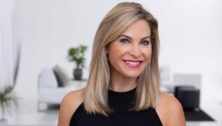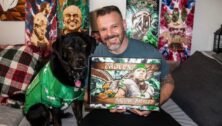Delaware County Leadership: Dr. William Scarlett, SVP of Cancer Care and Medical Director of Healthcare Delivery, Redeemer Health
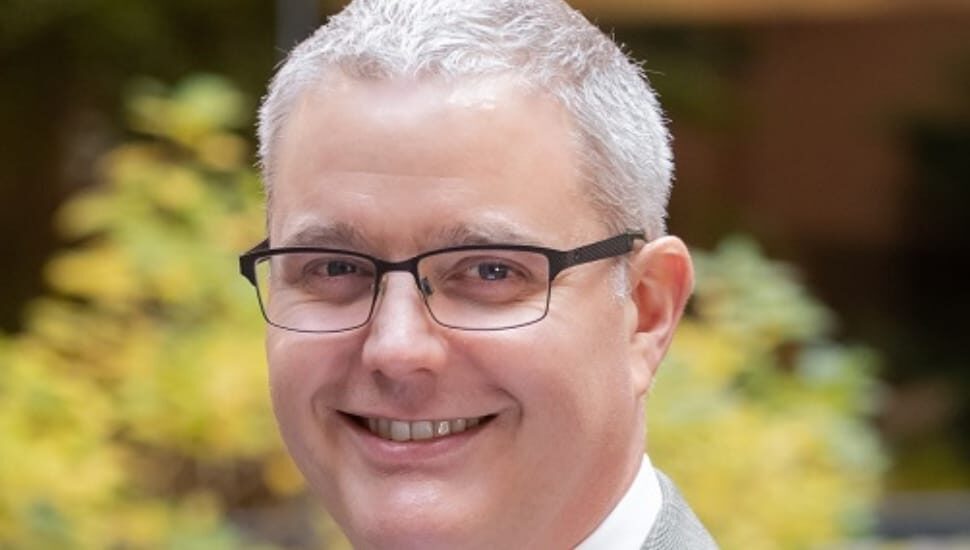

Dr. William Scarlett, Senior Vice President of Cancer Care and Medical Director of Healthcare Delivery at Redeemer Health in Meadowbrook, spoke to DELCO Today about growing up in a small town in Massachusetts, the lessons he learned from working in construction in the summers as a teenager, and his most dramatic tennis match in high school.
Dr. Scarlett also discussed his meandering path to the medical profession, including his first job doing research on antidepressants, his many years treating cancer patients as a plastic surgeon, and his recent degree in healthcare management from Harvard. Finally, he explained how Redeemer Health provides cutting-edge cancer care with a personal touch.
Where were you born, and where did you grow up?
I was born the older of two boys in Wilbraham, Mass. Its only claim to fame is that it is the home of Friendly’s Ice Cream. I remember that once I had a bicycle, we were gone from Saturday morning until mom was yelling out the back door at dinnertime. We were just bouncing from one backyard to another or finding a place to go fishing.
What did your mom and dad do?
My dad was an actuary. My mom had worked in insurance, and that’s where they met. Still, at the time, you couldn’t date or marry people in the same department, so she ended up having to leave that company when they got engaged. Once she was pregnant with me, she stayed at home.
Did you play any sports when you were growing up?
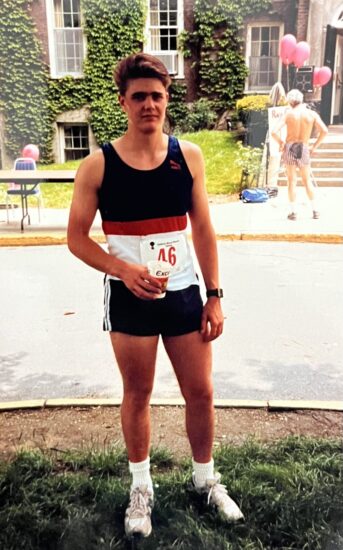
I played JV football the first two years of high school, but I wasn’t fast enough to be in the back or big enough to be in the front. In my junior and senior years, I did cross country and tennis. Tennis was the only place where I excelled. I did make it to states my senior year.
Do you have a favorite memory of playing tennis?
I tended to get overly enthusiastic with my games. One time, it was down to the wire about whether we were going to go to states. And, in my defense, I did have my rackets overstrung, so they were too tight. But I lost my temper and hit my racket on the cement, and it exploded. I had had this happen before, so I had an extra racket. A couple of games later, I did the same thing with that racket. So the coach had his racket there, and I remember him handing it to me and saying, ‘If you break this racket….’ Fortunately, I kept it under control and won that match, which meant we got into states.
What about jobs? Did you work in high school?
After my freshman year, I got a job working in construction. I showed up on their job site, knowing absolutely nothing. They just handed me a shovel the first few weeks and said, ‘Dig here.’ Then they handed me the tar bucket, and I would tar the foundation. By the end of that summer, I was putting in insulation and helping the guys hold the windows while they were putting them in. But by the end of my third summer, they had me doing custom cabinetry work. It was pure mentorship. These guys took the time to show me how to do it. It was hard work, but I got a good education from it.
What personal lessons did you take from that experience that still influence you today?
Open communication was the biggest thing for me, and it goes back to mentoring. The foreman would show me how to do something, and I felt comfortable enough to say, ‘Hey, before I cut this, can you just take a quick look at it and make sure my measurements are correct?’
From a leadership style, I make sure that I’m always open. If they’re coming to me with a question, even if they know the answer and want to double-check, that’s great.
What kind of music floated your boat in high school and college?
I listened to whatever was popular, which tended to be classic rock, but my dad had always played the trombone, so he liked jazz. When it came time in fifth grade to learn to play an instrument, he went down to the basement and got me the trombone. I played the trombone all through junior high and high school and got a music scholarship to go to college. I didn’t continue with it after the first year, but I enjoy music. Because we weren’t playing Led Zeppelin, we were playing the classics; my tastes run the gamut because of everything I was exposed to growing up.
So, where did you end up going to college, and why there?
I went to Dickinson College. It was good because I wasn’t at this huge academic powerhouse. I had smaller classes and felt more comfortable asking questions, so it worked well for me.
When did the medical bug bite you?
It didn’t bite me. If the market hadn’t changed in the ‘80s, I would have stuck with what I was doing in construction. Those people were making a lot of money because of the housing boom. Then, all of a sudden, that dropped out. So, I went to college. I enjoyed biology and doing experiments, so I majored in biology and minored in chemistry.
In college, I got an internship in a lab at the University of Minnesota, cleaning test tubes and helping with that sort of thing. I did that for three summers. After I graduated, I was offered a job at the University of Minnesota doing research. I absolutely loved it. It felt like I was contributing because I was in a lab that was working on reversing the effects of antidepressants in case someone takes too many and overdosed.
It was amazing – we were able to take a rat and give it a high dose of a tricyclic antidepressant and cause a flatline on the EKG, then put this medication in and watch it return entirely to normal. I felt like this was going to change the world! But right then, in the early 90s, the NIH money started drying up. They said, ‘If you want to continue to do your research and get money from the government to do it, you need to become a doctor.’ So that’s why I applied to medical school.
I still needed a job when I got to University of Des Moines Medical School. Because I had been working in research, I knew how to scrub and how to sew, so I got a job showing other students how to do all those things. Because I was doing that, I started to meet the surgical residents, and they invited me to come to grand rounds and spend time with them. They would say to me, ‘What are you going to do when you graduate?’ They recommended that I consider doing my residency in surgery.
It wasn’t until my fifth year of general surgery that I did a plastic surgery rotation at Johns Hopkins. I fell in love with it. I currently work exclusively with cancer patients and find it extremely rewarding.
Looking over the past 25 or 30 years, Dr. Scarlett, who are the people who saw promise in you and opened up doors?
One was Bill Keane, who gave me the internship job at the University of Minnesota, while I was in college. He was a nephrologist and had a daughter who was also going to Dickinson, whom I knew. I started talking to him, and that led to three summer internships and then a full-time job after graduation.
Another person who has pushed me my whole career is Beth DuPree. Beth is a breast surgeon who has worked in Montgomery County for many years. She would always laughingly say she had ‘voluntold’ me to do things. She pushed me to do more than I was doing on a regular basis. I was never comfortable with public speaking, and she would say, ‘I told them that you were going to give a lecture on this topic.’ The next thing I knew I was in front of 1,500 people. She also pushed me into administration by saying, ‘Listen, you’re helping people one-on-one right now, but I think you could do even more.’
Philadelphia doesn’t have a shortage of doctors. What do you think Beth saw in you?
That’s a great question. I’ll have to ask her. But I think it was the compassion and the unyielding “doggedness.”
Now, at Redeemer Health, what’s your role, and what are you doing on a day-to-day basis?
When I started with Redeemer, I was in private practice. They approached me some years later to be the interim chair of surgery after I’d been working at the hospital for a while. That interim role became a permanent role, and I was the chair of surgery. Then they asked me to be director of surgical services, which includes pre-op care, post-op care, and anesthesia.
Then, when Redeemer Health started a relationship with MD Anderson Cancer Center at Cooper, they asked if I would be willing to be the executive director of the cancer center. That was a big step for me, and I was excited about the possibility of making a difference.
I agreed to do it, and it’s been a lot of learning. I remember at one point – when you talk about people pushing me in my career – I was sitting there with Mike Laign, Redeemer Health’s CEO, and I said, ‘Mike, I don’t know what I’m doing.’ He said, ‘Well, if you don’t know how to do it, go back to school.’ So I did. I got a master’s in healthcare management from Harvard. I just finished that in May 2021.
I think anybody who goes into medicine has to be a lifelong learner. It’s not only the techniques and medications that change – but we’re now looking at different payment types, direct-to-consumer programs and on-line competition. More companies are now self-insured. The whole landscape is changing, and the mentorship and education I received from Harvard has put me in a situation where I can look at more than just one patient at a time.
Last week, I was asked to be the senior vice president of cancer care and the medical director of healthcare delivery.
What’s unique and distinctive about Redeemer Health from your perspective?
Our relationship with MD Anderson at Cooper is extremely unique. There were other institutions I’ve worked at that had affiliations with other cancer centers, and it was purely financially based.
Our relationship with MD Anderson at Cooper is entirely different from the standpoint that everything had to meet their specs. We had a call center in place for the hospital. They said, ‘Nope, we want your cancer patients calling directly to the cancer center.’ We had to increase staffing to have a nurse navigator for each disease we are treating, instead of one who addresses multiple types. We have to get every new cancer patient seen within three days. The treatment you’ll receive at Redeemer Health will be the same as if you received treatment in Houston, where MD Anderson Cancer Center is based.
But let me step back – what makes the difference is that we’re still a community hospital. We still have that personal touch. When the patient walks into the cancer center, if they’re in the process of receiving treatment, the staff greets them by name. I think that’s what sets us apart. We are providing cutting-edge cancer care, backed by one of the leading cancer centers in the region, in a community hospital setting.
What do you do with your free time, Dr. Scarlett?
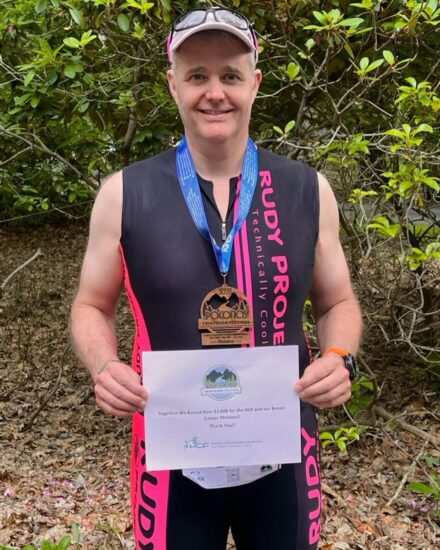
I’ve been married for 20 years and I’m the proud father of two daughters – a 16-year-old and a 9-year-old. I try to spend as much time with them as possible. They’re great kids.
I have forced myself to try to stay in shape. I have now done two half-Ironman triathlons. My goal is to do a full Ironman someday, but getting this 50-some-year-old body in shape will take some time.
I also have a book that I’m writing, “Demanding Compassion.” It’s been an amazing education, even if I never get a chance to publish it. I’ve been able to interview Congressmen and ask them about healthcare. I’ve been able to interview patients who have had good care and not-so-good care. I’ve been able to interview litigation attorneys from both sides on what is causing people to go to court, and what we could do to prevent these disputes.
Do you read much?
It’s funny – there’s a Japanese term for “the potential of unread books – Tsundoku.” I am always reading at least two books, if not three, and I always have about 10 more that I’m waiting to read.
Do you have a favorite author?
You know, I don’t. If I’m reading an article or listening to a speaker or a podcast, and I’m enjoying it, and they reference a book, I immediately put it in my Amazon cart. Right now, I’m reading two.
I’m reading “Nudge” by Richard Thaler, which is an amazing book. It’s all about how we can influence people toward better decisions with choice architecture. The other one, which I’m reading for the second time and have recommended to multiple people, is “The Happiness Advantage” by Shawn Achor.
So, what keeps you hopeful and optimistic, Dr. Scarlett?
Science and technology certainly are advancing us. But it’s definitely people who keep me hopeful, like when I have a patient come in and tell me how nice the nurse was when the patient received her chemo. And I hear these stories, some not just in the cancer world. A person came into the emergency room and was treated and released. They had no way to get home, so one of the nurses paid for her to take an Uber home.
If you don’t turn on the TV and watch the news, you can see that people really are good. Those stories keep me hopeful, along with seeing that we are starting to focus on more important topics – we as a society rarely talked about disparities in healthcare until COVID.
Looking back over the last several years, what big issue have you changed your mind about recently?
The biggest thing is whether healthcare is a right or a privilege. With my training, we’re always looking at who will pay for it and how we will get reimbursed for it. Now, we are more focused on how we actually deliver it, and how we deliver it with equality. One of the things I’ve been trying to get more involved with is population health and the political environment around it.
Finally, Dr. Scarlett, what’s the best advice you ever received?
I think it was from my dad. He worked six days a week, if not seven days a week. I remember him saying to me, ‘Pick a profession that you really enjoy and that you feel like you’re making an impact,’ which is great advice. Still, he followed it up with satire, as he usually did, and said, ‘Because you’re going to be working for a long time.’ And it’s true – you spend most of your life doing whatever profession you choose. I’m trying to impress this upon my daughters, too.
Join Our Community
Never miss a Delaware County story!
"*" indicates required fields















![95000-1023_ACJ_BannerAd[1]](https://delco.today/wp-content/uploads/sites/3/2023/03/95000-1023_ACJ_BannerAd1.jpg)














